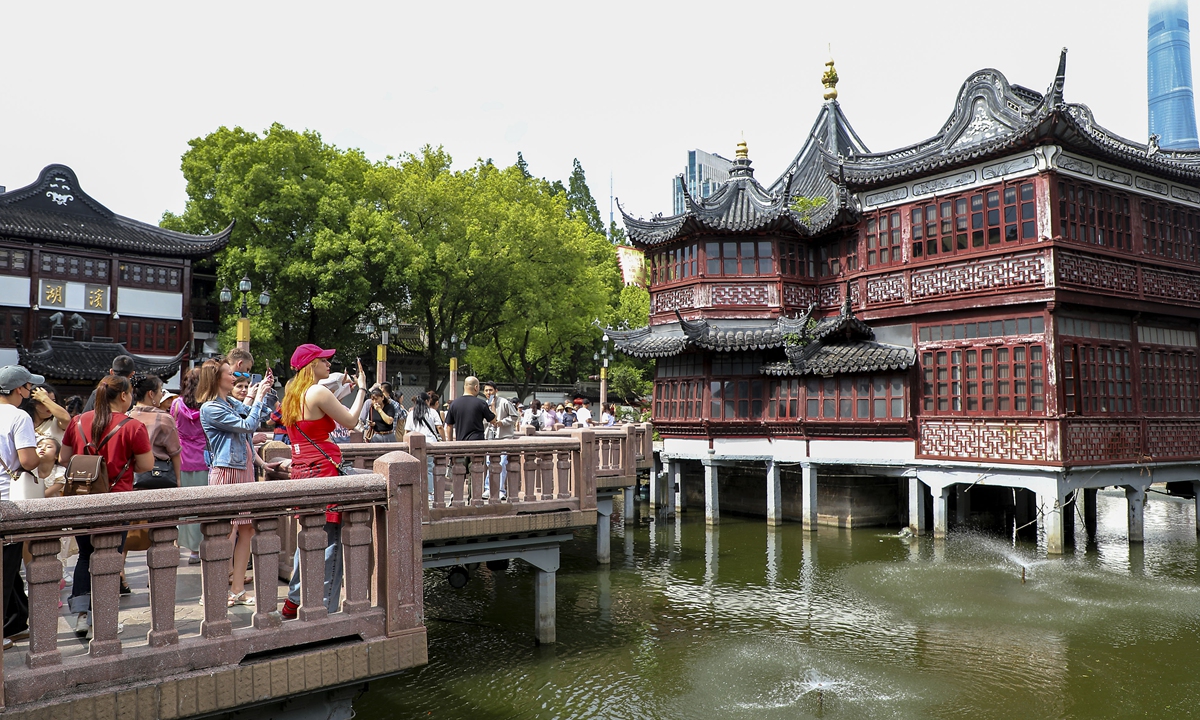
Tourists take photos of the Nine-turning Bridge in Yuyuan Garden in Shanghai on May 20, 2024. Photo: VCG
Multiple major cities across China recently announced the elimination of advance ticket reservation requirements for tourist attractions, aiming to enhance travel services and improve the travel experience for visitors as the summer tourism peak approaches.
Experts said that the fresh measure is poised to better meet the travel demands of both domestic and foreign tourists, adding to China's sweeping package of policies for facilitating inbound tourism.
Further streamlining entry measures at local scenic attractions will drive an ongoing boom in domestic and inbound tourism, stimulating consumer spending amid China's sustained tourism surge which further gained pace following the May Day and Dragon Boat Festival holidays, experts noted.
Beijing has announced the abolition of reservation requirements across all scenic spots in the city, except for key sites such as the Forbidden City and National Museum and some other sites that remain selectively open, China Media Group reported on Friday, citing the Beijing Municipal Bureau of Culture and Tourism.
Earlier in June, Shanghai announced that over 3,000 cultural and tourism venues in the city, including A-level tourist attractions, art galleries, museums, and libraries, among others, have abolished real-name reservation requirements, outside of a few popular locations, following Suzhou, East China's Jiangsu Province's announcement of plans for eliminating real-name reservation requirements at most tourist sites.
In light of a continuous economic recovery and a rapid revival in China's tourism market, there has been a continuous increase in demand for cultural, leisure, and tourism activities, according to Jiang Yiyi, Vice President of the School of Leisure Sports and Tourism at Beijing Sport University.
"China's proactive push for high-level opening-up has further accelerated the influx of inbound tourists," Jiang said, highlighting that these streamlined measures align with current demand trends both domestically and globally, proving timely and appropriate.
Foreign visits to China are rising. In the first quarter of 2024, a total of 466,000 foreign visas were issued, up by 118.8 percent year-on-year, while 1.988 million foreigners entered China visa-free, marking a substantial 266.1 percent increase year-on-year, data from the National Immigration Administration showed.
China has made substantial efforts to boost inbound tourism, such as resuming international flights and implementing visa-free policies for many countries, and has introduced facilitation measures such as streamlined visa processing and mobile payment options.
Jiang noted that the cancellation of the reservation system is crucial for facilitating inbound tourism and is expected to help attract more foreign visitors as more and more cities are taking similar action.
"The reservation system posed barriers to payment, language, and access to scenic areas for foreign visitors, for those who face challenges with the Chinese language or using mobile applications, removing the requirements will enhance their travel experience," Jiang said.
However, Jiang also stressed the importance of categorizing and managing scenic areas based on their own unique characteristics, particularly considering local natural and cultural characteristics alongside the carrying capacity of the attractions. For sites with stringent requirements for natural and cultural preservation, it remains essential to maintain visitor numbers within a manageable capacity range, Jiang added.




